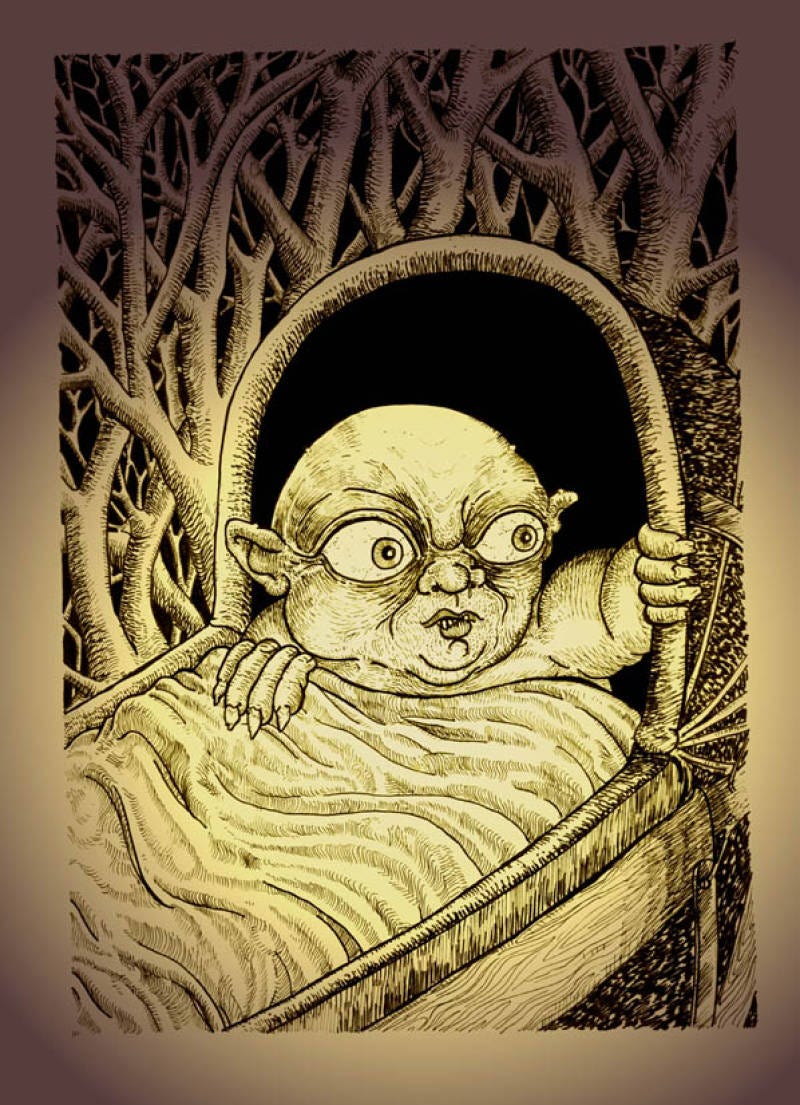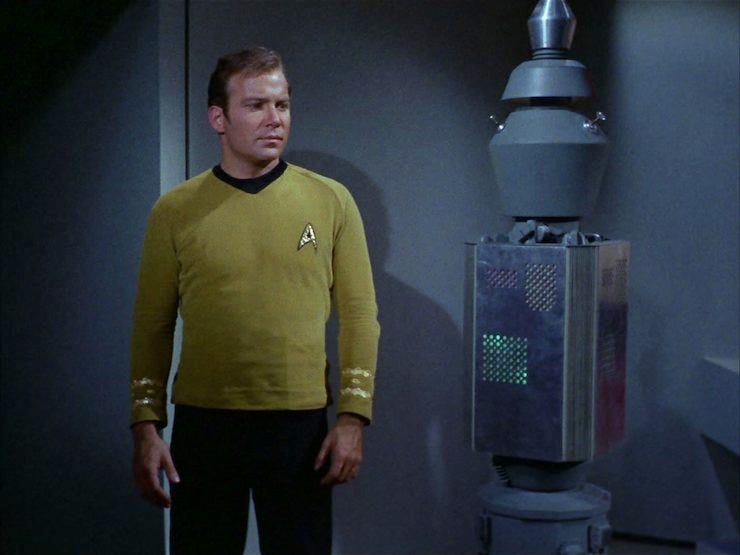Around midway through “The Changeling,” Spock explains to Kirk how NOMAD - the mass-destruction robot they’ve let aboard - came to be. NOMAD - who takes the shape of a small Dalek-esque probe that slowly floats at the height of the average cast member - was created to perform the exact mission the Enterprise is on. It is intended to seek out new lifeforms and civilizations. At some point though, NOMAD collided with an alien probe. The alien probe was designed to violate the Prime Directive; as "a “prelude to colonization,” the unknown probe would isolate and sterilize soil samples on hospitable worlds. Upon collision, the two probes merged and reconstituted into the New NOMAD currently threatening the crew. Now NOMAD seeks out new life, judges its suitability and level of “perfection,” and sterilizes the life if it is found wanting. As NOMAD says later, “I am perfect. Sterilization is correction.” Two foreign dreams met and became a nightmare. NOMAD is now a genocide machine.
Kirk has an odd response to this information.
KIRK: A changeling.
SPOCK: I beg your pardon?
KIRK: An ancient Earth legend, Mister Spock. A changeling was a fairy child that was left in place of a human baby. The changeling assumed the identity of the human child. So, it is to sterilize, and for sterilize read kill.
NOMAD is Gruagach by way of metal, then. A double agent of folklore. Programmed with an admirable mission, the mission of our heroes, he’s returned twisted and more powerful. His idea of perfection is measured against himself. The less like NOMAD you are, the more correction is needed, and no correction seems outside its power. The episode begins with NOMAD apparently having killed 4 billion people in the blink of an eye. Star Trek’s working on a galactic scale, but the number is still shocking, and it’s no surprise the episode continues to elide the actual impact in favor of being watchable rather than unbearably maudlin.
Kirk looks on at his twisted fake “son” NOMAD. NOMAD was voiced by Vic Perrin, whose massive list of voice acting credits includes heaps of Scooby-Doo villains across multiple iterations of the show. He also is the credited voice of the Metron in “Arena,” a character physically portrayed by Carole Shelyne.
The only saving grace for the crew is that NOMAD mistakenly believes Kirk created it, due to a pronunciation issue with its real creator’s name. “Jackson Roykirk,” if you squint, gets close to “Captain James Kirk,” and while that may be the least believable part of the episode, it is not its least successful. Out of deference to its maker, NOMAD plays along with the chain of command once it threatens its way on board. Its crimes end up more annoying than anything - it kills Scotty for touching it but brings him back to life on Kirk’s orders, it wipes Uhura’s memory because it believes her singing “inefficient” and without purpose. The robot isn’t entirely stupid though. Its suspicions grow as it realizes even creators have flaws. Biological inefficiencies, annoying moral restraints, and deficient interest in “improvements” drive the little thing mad. Soon, it’s breaking containment, zapping random redshirts, and forcing the Enterprise to accelerate well beyond safe speed. It’s racing to get to Earth; its creators must be “corrected.”
Which brings us to the least successful part of the episode. Rather than play Hellboy, Kirk plays Naruto. He correctly notes that NOMAD has made numerous mistakes already. The robot is not perfect, it misheard the phrase “Captain James Kirk” after all. This fact is so monumentally destructive to the robot’s inner logic - “I’m perfect, things that are not like me must be less perfect, sterilize to prevent the growth of imperfection” - that it chooses to commit suicide due to a nuclear amount of cognitive dissonance. Kirk is getting pretty good at this I guess, given that he did the exact same thing at the end of “Return of the Archons” too. At least there the robot was “merely” dictatorial rather than genocidal.
NOMAD follows McCoy off of the bridge. One of the more successful touches in the episode is the design of the robot, which is just odd and alien enough to be a compelling presence. The director, Marc Daniels, also chooses to shoot it with the low tracking shot pictured here at multiple points, which are great at giving the prop a looming, threatening aspect.
The end is the biggest problem because it - probably unintentionally - indulges in the common but misguided idea that ideologies of genocide or “purity” are based on logic at all. NOMAD is, after all, explicitly eugenic. He identifies certain traits he believes are better than others and culls entire planets in order to prevent those traits from spreading. That these traits are based on *him* is not an accident but the point; the eugenicist will invariably believe in the superiority of themselves over others, even if they would not claim perfection per se. But as Dan Olson and others have commented, worldviews like this must be malleable, because they are goal-oriented. They are not made of iron logic but instead able and willing to adapt to new - and this is the important part - useful information that can usher along the desired political outcome. A true genocide machine would not be convinced it misheard “Jackson Roykirk”; Kirk’s ruse would instead evidence that humans lie. Liars are not perfect. Imperfection needs correction.
Perhaps that’s why NOMAD needs to be a robot. There’s this perception, especially in 50s and 60s science-fiction, that computers require a perfect logical narrative to operate. As stated above, “Return of the Archons” operates on the same premise. When Kirk points out the logical flaws that the robots have failed to pick up on, they literally explode. I don’t particularly like this trope though, because it doesn’t make any sense. Computers take input and provide output according to internal processes. Those processes must be programmed by people. Code is not law, since laws can be broken. Code is direction, and a paradoxical direction does not work by definition. These robots would not need to be argued into suicide: they would just brick. Captain Kirk would not have to point all this out to them.
I suppose we should view “The Changeling” as escapist then. This is an episode where evil ideas, patently absurd, are defeated by argument alone. Where the only thing that matters is the internal consistency of the worldview. It’s a shame we have to deal with people out here.
Stray Thoughts
There is a running thread in this episode about NOMAD being Kirk’s son, backed up by the final line: “Well, it thought I was its mother, didn't it? Do you think I'm completely without feelings, Mister Spock? You saw what it did for Scotty. What a doctor it would've made. My son, the doctor. Kind of gets you right there, doesn't it?” I found this thread underdeveloped and not too compelling. To the extent it works, it works with NOMAD as a kind of evil Prodigal Son, returned to punish us for our sins of exploration. But given that the Enterprise is an unquestioned good in Star Trek, I don’t think that holds up either.
The worst stuff in this episode is undoubtedly Uhura’s mind wipe, wherein Nichelle Nichols is forced to act like a kindergartener as they reteach her everything she needs to know. There is a bizarre amount of broad comedy in an episode that features, again, a literal genocide machine.
Spock learns about NOMAD’s history, in part, by mind melding with it. I guess he can mind meld with machines too? If I were Kirk, I’d order him to talk to the ship and ask it why it breaks all the time.
Photo Credits
Changeling header: https://www.irishpost.com/life-style/exploring-the-irish-mythology-changelings-170347
Nomad and Kirk: https://www.tor.com/2015/12/15/star-trek-the-original-series-rewatch-the-changeling/
Nomad and McCoy: https://www.tor.com/2015/12/15/star-trek-the-original-series-rewatch-the-changeling/






